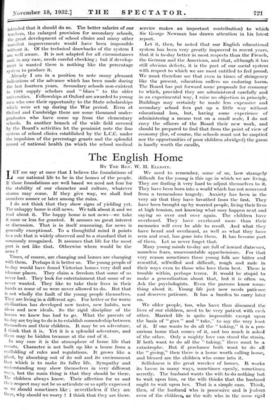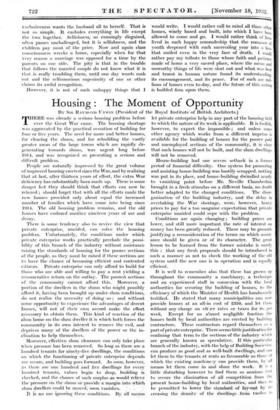The English Home
BY TliE REV. W. II. ELLIOTT.
LET me say at once that I believe the foundations of our national life to be in the homes of the people. If those foundations are well based we need not fear for the stability of our character and culture, whatever storms may .come. If they give way, we shall find ourselves sooner or later among the ruins.
I do not think that they show signs of yielding yet. The unhappy home is still news. We talk about it and we read about it. The happy home is not news—we take• it more or less for granted. It arouses no great interest or discussion. That is in itself reassuring, for news is generally exceptional. To a thoughtful mind it points to a rule that is widely observed and to a standard that is commonly recognized. It assumes that life for the most part is not like that. Otherwise where would be the news ?
Times, of course, are changing and homes are changing with them. Perhaps it is better so. The young people of to-day would have found Victorian homes very dull and irksome places. They claim a freedom that some of us never had. They look for entertainment that some of us never wanted. They like to take their lives in their hands as some of us were never allowed to do. But that is not wholly the fault of the young people themselves. They are living in a different age. For better or for worse civilization has developed new tastes, new habits, new ideas and new ideals. So the rigid discipline of the homes we knew has had to go. What the parents of to-day are trying to do is to establish comradeship between themselves and their children. It may be an adventure. I think that it is. Yet it is a splendid adventure, and there may be hidden treasure at the end of it.
In any case it is the atmosphere of home life that counts. Character is not built up like a house from a scaffolding of rules and regulations. It grows like a plant, by absorbing out of its soil and its environment that which is to make its fuller life. Sympathy and understanding may show themselves in very different ways, but the main thing is that they should be there. The children always know. Their affection for us and their respect may not be so articulate or so aptly expressed a'S we should sometimes like ; nevertheless if they are there, why should we worry ? I think that they are there. We need to remember, some of us, how strangely difficult for the young is this age in which we are living: They are finding it very hard to adjust themselves to it.
They have been born into a world which has not recovered from a tremendous tragedy. Anxiety has been in the very air that they have breathed from the first. They have been brought up by worried people, living their lives at high tension, not knowing what may happen next and saying so. over and over again. The children have overheard. They have overheard more than their memories will ever be able to recall. And what they have heard and overheard, as well as what they have seen and read, has gone into them. It has become part of them. Let us never forget that.
Many young minds to-day are full, of inward distresses, nameless tears, unaccountable apprehensions. For that very reason sometimes these young folk are bitter and resentful, selfwilled and difficult, rough and rude in their ways even to those who love them best. There is trouble within, perhaps terror. It would, be stupid to make a generalization about that, but it is often so. Ask the psychologists. Even the parsons know some- thing about it. Young life just now needs patience and deserves patience. It has a burden to carry later on.
We older people, too, who have thus discussed the lives of our children, need to be very patient with each other. Married life is quite impossible except upon the basis of " give " and "take," to say the very least of it. If one wants to do all the "taking," it is a pre- carious home that comes of it, and too much is asked of the other. Only a mighty love can stand the strain.; If both want to do all the "taking," there must be a catastrophe. But if perchance both want to do all the "giving," then there is a home worth calling home, and blessed are the children who come into it.
Selfishness is the great wrecker of homes. It works its havoc in many ways, sometimes openly, sometimes secretly. The husband wants the wife to do nothing but to wait upon him, or the wife thinks that the husband ought to wait upon her. That is a simple case. Think, then, of the husband who is possessive and is jealous even of the children, or the wife who in the same rigid exclusiveness wants the husband all to herself. That is not so simple. It excludes• everything in life except the two together. Selfishness, so cunningly disguised, often passes unchallenged, but it is selfishness, and the children pay most of the price. Now _and again class ,consciousness wrecks a home, especially when for that very reason a marriage was opposed for a time by the Parents on one side. The pity is that in the trouble that follows the married couple do not know what it is that is really troubling them, until one day words rush out and the selfeonscious superiority of one or other claims its awful recognition.
However, it is not of such unhappy things that I would write. I would rather call to mind all those °thee homes, wisely based and built,. into which I have been allowed to come and go. I would rather think of lives lived in such happy comradeship that the romance of youth deepened with each succeeding year into a love that smiled even in the very face of death. I would rather pay. my tribute- to those whose faith and patience made of home a very sacred place, where the mean and unworthy things of life were shut out and what was best and truest in human nature found its understanding, 'its encouragement, and its peace. For of such are mil. lions of homes even to-day, and the future of this nation is builded firm upon them.

































































 Previous page
Previous page